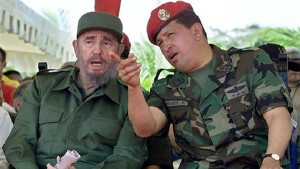Carlos Sánchez Berzaín
July 31, 2018
 (Interamerican Institute for Democracy) The Marxist statement regarding the struggle between the classes to forge Socialism and advance toward the Communism of a society without social classes, was adopted by Cuba’s Castroist regime in the decade of the sixties and replicated by the Castroist Chavist doctrine of the 21stCentury. With that ideological farce, this undertaking has led to the creation of Organized Crime’s dictatorships in Cuba, Venezuela, Nicaragua, and Bolivia that have replaced politics with the daily commission of crime and the imposition of three social classes; that of those who have everything because they are part of the group that holds power, that of the majority who live in poverty and are compelled to “try to make it” on a daily basis in order to survive, and that of those who were forced to flee their country.
(Interamerican Institute for Democracy) The Marxist statement regarding the struggle between the classes to forge Socialism and advance toward the Communism of a society without social classes, was adopted by Cuba’s Castroist regime in the decade of the sixties and replicated by the Castroist Chavist doctrine of the 21stCentury. With that ideological farce, this undertaking has led to the creation of Organized Crime’s dictatorships in Cuba, Venezuela, Nicaragua, and Bolivia that have replaced politics with the daily commission of crime and the imposition of three social classes; that of those who have everything because they are part of the group that holds power, that of the majority who live in poverty and are compelled to “try to make it” on a daily basis in order to survive, and that of those who were forced to flee their country.
When the Berlin Wall fell (1989) and the Soviet Union disappeared (1990-1991), Cuba’s Castroist dictatorship was left orphaned, devoid of an ideological enunciation, but above it all without the financial aid that allowed it to survive as a parasite, generate guerrillas and generate subversion with which it bloodstained the Americas. Without the Soviet’s financial aid, the Castroist system took Cuba to a “Special Period” in which it agonized when in 1999 Hugo Chavez delivered Venezuela’s oil resources, and afterwards the entire country to Fidel Castro, thus building the Castroist Chavist doctrine that destroyed Latin America’s democracy in the 21stCentury.
The Sao Paolo Forum in 1990 was the dictatorial reaction to the Soviet Communism’s catastrophe and was gathered, for the first time, with the objective of addressing the international scenario following the fall of the Berlin Wall and to confront “neo-liberal” policies. It is the tool with which the Castroist dictatorship formulated the “multiplication of the confrontation axis” strategy, going beyond class struggles to the fight against any element that may be useful to destabilize democratic governments.
The 21st Century in the Americas is the history of the Castroist Chavist buildup, apex, and agony, that was presented as a political undertaking and turned out to be criminal. A system that; bloodstained the region again with -as its standard- the violation of Human Rights, destruction of economies, creation of crises, construction of narco-states, institutionalization of corruption (“Lava Jato”, as evidence), sustainment of terrorism and threats to peace. Their victims are widespread throughout the world, but the peoples from Cuba, Venezuela, Nicaragua, and Bolivia are their hostages.
The worn-out cliché of “liberation of the peoples” as an “antiimperialist” argument and slogan for massive demonstrations, has remained to become “the peoples’ oppression” that is corroborated by the quantity of massacres, assassinations, torture, political prisoners, exiles, and the daily life the people must endure.
Cuba has the highest level of division in their society into three classes: The family/military inner circle that has it all, including great wealth outside of their country and who own the State and manage it as feudal lords through a mixture of managing the needs that they themselves have created and of the institutionalized crime. Cuban people have popularized the verb “to solve” representing they must do whatever it takes in order to survive, and in this realm the regime has achieved equality in misery. Millions of Cubans live in exile and form a sort of diaspora that has lasted decades, over which the regime continues to exert sustained efforts to penetrate and divide.
In Venezuela we can see, in real time, the establishment of a tripartite society. Now the regime has been exposed for multimillion dollar fortunes criminally obtained by members of its elite. Business and restaurants are filled and working well in Caracas for those who have dollars, while the majority of Venezuelans depend on government handouts just to be able to eat. There are no medicines, there are frequent electrical power outages, and the government manages the needs it creates in order to continue generating dependency and political subordination. Venezuelans conjugate the verb “to solve” and the regime boosts the departure of millions of Venezuelans.
Nicaragua under daily massacres by dictator Daniel Ortega, fights valiantly and continues to resist in order not to replicate the agenda lived by Venezuela recently. Bolivia fights to keep dictator Evo Morales from consolidating the electoral farce of again becoming a candidate to place the country in the final phase of constructing societies like that of Cuba and Venezuela.
Translated from Spanish by Edgar L. Terrazas, member of the American Translators’ Association, ATA # 234680.
Published in Spanish by Infobae.com on Sunday July 29th, 2018
 Carlos Sanchez Berzain Abogado | Estadista | Político | Politólogo
Carlos Sanchez Berzain Abogado | Estadista | Político | Politólogo
